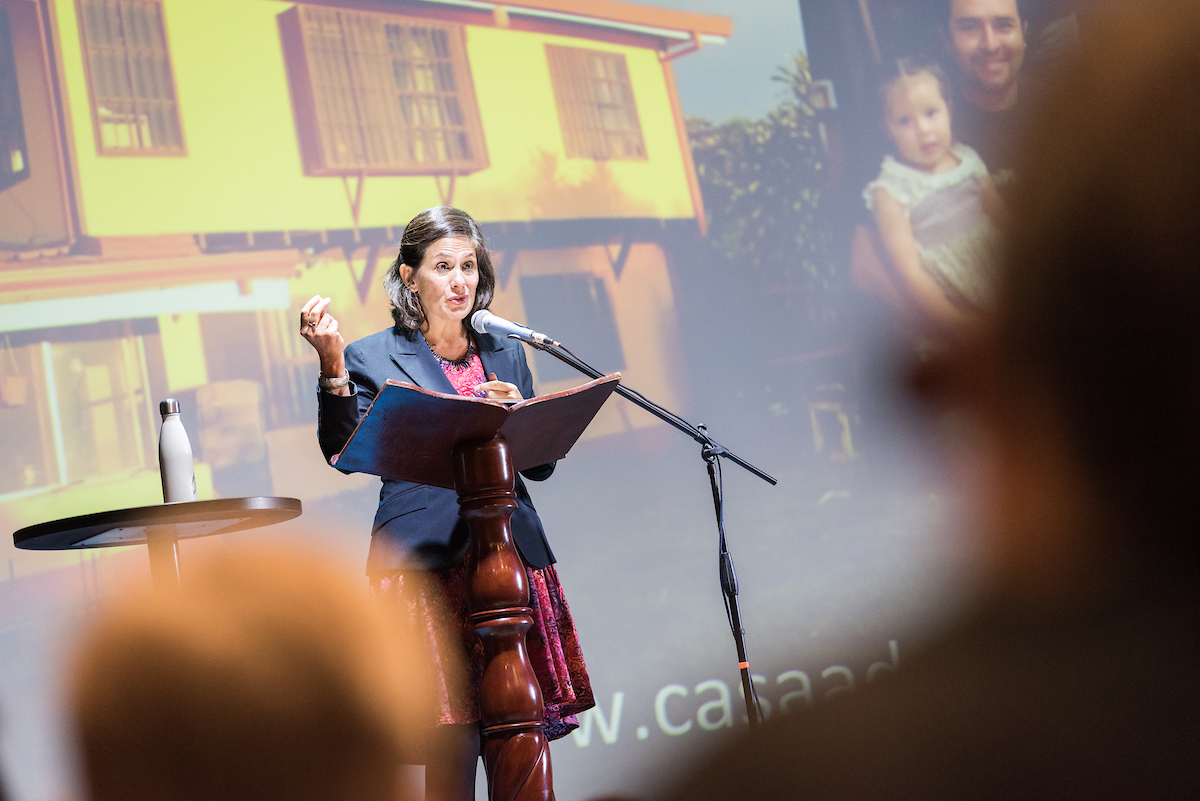
Presentation by Ruth Padilla de Borst in the Plenary on Relationships Old and New during the Global Christian Forum in Bogotá. Photo: Albin Hillert/WCC
The third global gathering of the Global Christian Forum in Bogota, Colombia has featured a biblical perspectives session, led by evangelical leaders on “Old and New Relationships”.
Commissioner Christine MacMillan, the Associate Secretary General for Public Engagement of the World Evangelical Alliance, invited participants to reflect on what ‘old’ and ‘new’ really means.
“The World Evangelical Alliance, now well over 150 years old can be viewed as over 150 years young. For all of us coming from our Christian expressions of both new and old, history and history in the making, we ask the question: do relationships get old or are they newly revived?” MacMillan asked.
She noted, “This morning two of our presenters reflect differences of old and new worlds, differences in gender, language, culture and age but with a desire to live a message of God who is unchanging and seeking to stabilize our past, present and future in new and refreshing ways of truth and life. God does not get old.”
Onesimus: From Slave to Brother
Leading the first part of the session was Ruth Padilla DeBorst, Coordinator of the International Fellowship of Mission as Transformation, born in Colombia, and now living in Costa Rica.
She focused on the letter of the Apostle Paul to Philemon, in which Paul asks him to welcome back his run-away slave Onesimus.
In their context, Onesimus would have been subject to severe punishment or death. But in his letter, Paul not only asked Philemon to accept Onesimus again as his slave, but also as a brother in Christ – a radical change in their relationship.
“Paul is aware that the call he has placed before Philemon and his community is not a simple one. He knows well the debates of a spirit tempted to live according to the expectations of the social and political context and according to greedy, selfish and personal impulses and ambitions for personal benefit and exclusion of others.
“For that reason, he pleads that the grace of the Lord Jesus Christ, who gave himself in order to make peace, to establish right relations, to free and give full life to all people, that that grace take root in the heart of that faith community,” Padilla said.
Padilla referred to the current global context, in which 27 million people find themselves enslaved.
She said, “In our Latin America, under the veneer of progress, girls and boys, women and men are being exploited in forced labor, internal and international trafficking, involuntary recruitment for military forces, child labor in dangerous conditions like mines or manipulating chemicals or heavy machinery. Millions more work in infrahuman conditions, with no benefits of security.”
“The challenge for God’s people today is the same as the one Paul voiced to Philemon and the community of Jesus’ followers in Colossae. We, too, need to plead that God shed his grace upon us,” said Padilla.
This would open people’s eyes and unearth the slavery hidden in homes, neighborhoods, cities and countries enabling humanity to radically commit to the eradication of the causes of slavery: poverty, exclusion and discrimination.
With courage they can confront people, institutions and systems that oppress even if it demands economic investment and personal security risks.
“So that we may live with integrity as alternative communities, guided by the law of love, acceptance and restorative reconciliation far beyond any doctrinal prejudice, cultural tradition, privileged or excluded position,” Padilla concluded.
Can sound theology follow personal experience?
Building on Padilla’s examination of the changed relationship between Philemon and Onesimus, Dr. Thomas Schirrmacher, WEA’s Associate Secretary General for Theological Concerns, added other biblical examples of believers whose perspectives on God and other people were transformed through experiences.
He questioned the view that experience cannot precede theological understanding, referencing the stories of Job, whose suffering – not his theological discussions with his friends – transformed his view of God; and Peter’s vision of a cloths full of unclean animals coming down from heaven, which opened his mind and heart to meet and disciple Cornelius, a gentile centurion who would be considered unclean by Jews.
“Is Evangelical or even Pentecostal theology with no experience possible, just as a pure academic exercise in comparing and judging theologies?
“Can we have a correct understanding of the Trinity without the life-changing experience of being loved by, and loving, the triune God?” Schirrmacher asked.
He noted that “the global gathering of the Global Christian Forum gives me the rare chance to prove from Scripture, that experience of how God acts in this world in the lives of other people and churches, that growing mutual relations, that experience is a good road to a sound theology.”
Schirrmacher explained, “Holy Scripture is God’s revelation and our highest authority. But God uses experience to shape our theology. In other words, if you are firmly committed to the authority of Scripture, experience of how God acts through other people and churches is a good road to a sound theology.”
He said, “Thanks be to the Triune God that he did not just leave us a book inspired by the Holy Spirit and revealing Jesus as Saviour to us, but that he sent the Holy Spirit himself into us.
“Thank God that he uses multiple means to help us more deeply understand His revelation, put it into practice in our lives, and grow all the more in love for our Father in Heaven, our Saviour Jesus Christ and the Holy Spirit.”
Read Padilla’s full speech here
Read Schirrmacher’s full speech here
